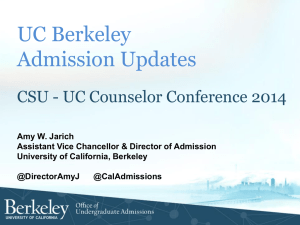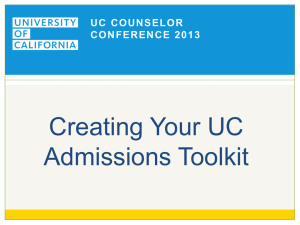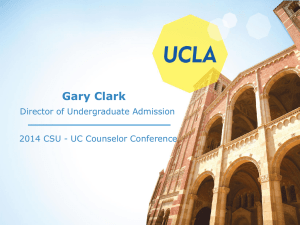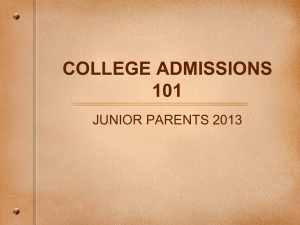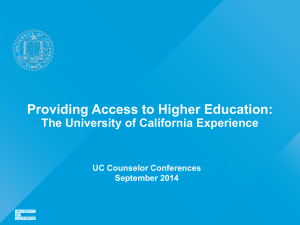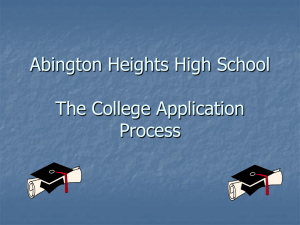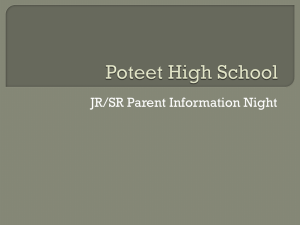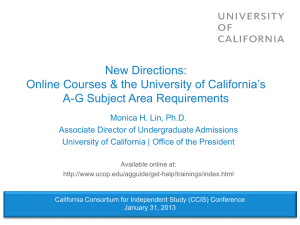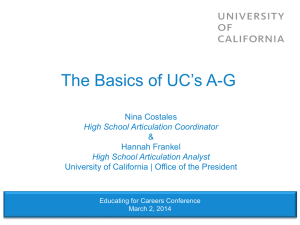Only UC-approved online courses
advertisement
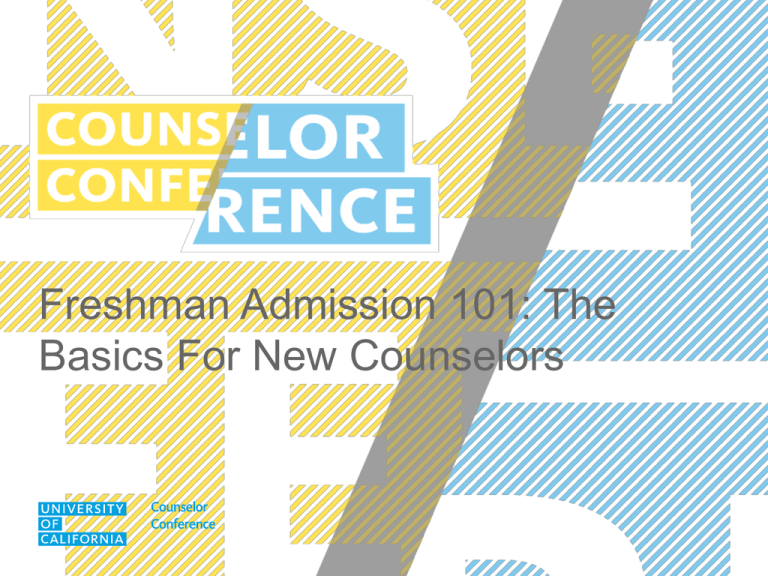
Freshman Admission 101: The Basics For New Counselors This workshop will cover: Freshman Admissions requirements Campus selection using comprehensive Review Guiding students through the college preparation process Resources for you and your students Frequently asked Topics and Questions UC COUNSELOR CONFERENCE September xx, 2014 UC Message NOW, THEREFORE, BE IT RESOLVED that the Regents direct the President, in consultation with the Academic Senate and campus admissions professionals, to ensure that all applicants receive an individualized review that ensures trained readers examine applicants’ full files to evaluate their accomplishments in the context of opportunity . . .” “BE IT RESOLVED that University of California campuses must remain committed to recruiting students from the full range of California high schools and regions in order to achieve the potential of the University’s admission policy for California’s students . . .” UC COUNSELOR CONFERENCE SEPTEMBER XX, 2014 Freshman Admissions Freshman Requirements Coursework • Complete any 11 UC-approved “a-g” courses prior to senior year • Complete all 15-course “a-g” subject pattern by the end of senior year • Courses must be completed with a grade of C or better Grade point average • Minimum 3.00 weighted GPA (for CA Residents) • Minimum 3.40 weighted GPA (for Non-CA Residents) • Based on “a-g” courses completed in 10th and 11th grades, including summer courses Examinations • ACT with Writing or SAT Reasoning Test by December of senior year • Some campuses may recommend SAT Subject Tests for specific majors: http://www.universityofcalifornia.edu/admissions/freshman/requirements/examinatio n-requirement/SAT-subject-tests/ UC COUNSELOR CONFERENCE September xx, 2014 Freshman Admissions UC COUNSELOR CONFERENCE September xx, 2014 California- Residents Students California Residents students whose combined high school GPA and Test scores place them in the top 9 percent of the state’s high school graduates (qualified in the statewide context) are guaranteed admissions to UC, as are students in each participating California high School who are in the top 9 percent of their class (eligible in the local context, or ELC). UC COUNSELOR CONFERENCE SEPTEMBER XX, 2014 Statewide Context To determine whether students rank in the top 9 percent statewide, refer to our admissions index calculator: admissions.universityofcalifornia.edu/freshman/californiaresidents/admissions-index.html UC COUNSELOR CONFERENCE SEPTEMBER XX, 2014 Local Context Our eligibility in the local context (ELC) program recognizes students accomplishments in the light of opportunities offered by their particular high schools. For California students to be considered for a guarantee in the local context, they must complete 11 specific yearlong courses by the end of junior year (including summer) UC COUNSELOR CONFERENCE SEPTEMBER XX, 2014 Local Context Continued UC COUNSELOR CONFERENCE SEPTEMBER XX, 2014 Admissions by Examination To be considered students must… take either the ACT Plus Writing or the SAT, as well as two SAT Subject Test in two different disciplines. achieve a minimum UC score total of 410 (425 for non residents) In additional, they must earn a minimum UC Score of 63 on each component of the ACT Plus writing or SAT and on each of the subject Test. For instructions on calculating the UC Score, see admission.universityofcalifornia.edu/counselors/freshman/minimumrequirements/examination/index.html Students who qualify by examination are not guaranteed admissions. They are however, entitled to full review of their application. UC COUNSELOR CONFERENCE SEPTEMBER XX, 2014 Admissions By Exception Sometimes even the most creative, focused and intellectually passionate students aren’t able to fulfill our admissions requirements. If such students have the ability and potential to succeed at UC, they may qualify for admissions by exception. Applicants should use their personal statement or additional comments section of the application to explain their unique story. UC COUNSELOR CONFERENCE SEPTEMBER XX, 2014 Campus Selection Using Comprehensive Review Selection Selection Choosing students for admission when a campus cannot admit all applicants who meet the freshman admissions requirements Individual campus selection practices vary, but all draw from the same Comprehensive Review factors Comprehensive Review Unique to each campus; set by faculty committee Multiple types of Comprehensive Review Campuses don’t collaborate on admission decisions UC COUNSELOR CONFERENCE SEPTEMBER XX, 2014 Comprehensive Review Factors Campuses draw from 14 academic and personal factors approved by University faculty, including: Grades and test scores and: Quality of senior year program Special talents, achievements & awards Promise for leadership Recent, marked improvement in academic performance Significant community service Participation in student government Intensive study and exploration of other cultures Full list of factors: www.universityofcalifornia.edu/admissions/freshman/how-applications-reviewed/ UC COUNSELOR CONFERENCE SEPTEMBER XX, 2014 Comprehensive Review & the Apply UC Comprehensive Review is based on the entire application, including the personal statement Students need to take care to fill out the application thoroughly, including: Personal information Academic history Activities & Awards, plus quantitative or qualitative explanations UC COUNSELOR CONFERENCE SEPTEMBER XX, 2014 Personal Statement An opportunity for applicants to provide information that supports and enhances review process Adds clarity, richness and meaning to application and completes the application Enables applicant to make the best possible case for admission An admission decision is never based on the content of the personal statement alone UC COUNSELOR CONFERENCE SEPTEMBER XX, 2014 Personal Statement Applicants are asked to respond to two prompts: Describe the world you come from—for example, your family, community or school—and tell us how your world has shaped your dreams and aspirations. Tell us about a personal quality, talent, accomplishment, contribution or experience that is important to you. What about this quality or accomplishment makes you proud and how does it relate to the person you are? Word Count: 1,000 words total UC COUNSELOR CONFERENCE SEPTEMBER XX, 2014 Additional Comments Section Use Additional Comments box for clarification and expansion of important details. Describe anything else that you have not had the opportunity to include elsewhere in your application. Limit of 550 words The Additional Comments section is not required. UC COUNSELOR CONFERENCE SEPTEMBER XX, 2014 Guiding Students Through the College Preparation Process College Prep Over 4+ Years UC COUNSELOR CONFERENCE SEPTEMBER XX, 2014 7 and 8th Grade Seek out middle school counselor for course selection Attend orientation every year Begin volunteering in your community UC COUNSELOR CONFERENCE SEPTEMBER XX, 2014 9th Grade •Plan Out 4 Year Class Schedule •Explore Extracurricular Involvement UC COUNSELOR CONFERENCE SEPTEMBER XX, 2014 UC Admissions websites: Doorways A-G Course Lists Online Classes Community College Classes & Community College A-G list https://doorways.ucop.edu /list Counselor Resources: Options for Satisfying A-G Chart CSU-UC Comparison Chart A-G Guide Website 10th grade •Grades matter! •Continue involvement •Prepare for ACT and/or SAT •Explore campuses UC COUNSELOR CONFERENCE SEPTEMBER XX, 2014 10th Grade Free test prep resources: • www.number2.com •College Board SAT & ACT prep – text message of the day •KHAN academy www.khanacademy.org Tools to Explore Campuses: •UC Campus websites •Zinch: www.zinch.com/ •Cappex: www.cappex.com/ •The Princeton Review’s School Search: www.princetonreview.com/school search.aspx •CollegeWeekLive: www.collegeweeklive.com 11th Grade •Take on Academic Challenges •Pursue Leadership Opportunities •Take Exams •Tour Campuses 11th Grade Test taking tips: •Read! •Take practice tests early to know where you may need help •UC accepts both ACT with Writing and the SAT Reasoning Test and will take your highest test score from a single test date Academic Challenges: •Rigor of course schedule •College Courses UC COUNSELOR CONFERENCE SEPTEMBER XX, 2014 12th Grade 12th Grade •Apply to UC! •Continue to Succeed •Meet Provisions of Admission •File FAFSA •Apply for Scholarships Deadlines: • •UC Application Fall filing period: November 1–30 •File FAFSA at www.fafsa.ed.gov/ •Admissions notifications (posted online): March 1-30 •Students must opt-in to waitlists •Submit Statement of Intent to Register (SIR): by May 1st •Official high school and college records due: by July 1st www.universityofcalifornia.edu/apply UC COUNSELOR CONFERENCE SEPTEMBER XX, 2014 Apply UC Open August 1 Frequently Asked Topics & Questions What is the difference between repeating coursework and validation? Repeating Coursework: To take the exact same course over again to replace a D or F grade Validation: To take a higher level course in a subject area that requires sequential knowledge (only Math & Language Other than English) There are two types of validation: Validation of Coursework: “Subject Omission” - validation of a lower–level course even if the lower level course was not actually completed. Validation of Grades: “Grade Deficiency” – validation grades of D or F in a lower level course after completion of a higher level course with a grade of C or better. UC COUNSELOR CONFERENCE SEPTEMBER XX, 2014 Can students take online courses to satisfy “a-g” subject requirements? Online courses can satisfy an “a-g” subject requirement in 3 ways: 1. High school purchasing UC-approved online courses from a provider/publisher. List of providers available on “a-g” Guide. Providers’ “a-g” course lists available on Course List website. Approved courses must be added to high school’s “a-g” course list. 2. Student enrolling independently in UC-approved online course. 3. Principal certification of online courses: not allowed UC COUNSELOR CONFERENCE SEPTEMBER XX, 2014 What’s the online course policy? Effective for online courses completed during 2013-14 academic year and beyond. Only UC-approved online courses can be used to satisfy the “a-g” subject requirements. UC does accept online college VPA courses. The online course policy and requirements approved by the Board Admissions and Relations with Schools (BOARS) only extends to high school-level online courses. UC accepts online college courses to satisfy all of the "a-g" subject requirements UC COUNSELOR CONFERENCE SEPTEMBER XX, 2014 What if I have more questions about evaluation or a question about a specific student? Go to today’s session: Freshman Admissions 201 “How we review freshman applications” If you have system wide questions on the “a-g” course list and the process – for high school counselors hsupdate@ucop.edu If you have a general question about evaluation or if you have a specific question about a student’s situation, you can: Email AskUC@ucop.edu with your question, any time of the year Sign up for the Counselors and Advisers Bulletin listserv to stay up to date on the latest UC Admissions information: Email AskUC@ucop.edu with the subject line “Subscribe to Counselors Listserv” UC COUNSELOR CONFERENCE SEPTEMBER XX, 2014 What is the best advise to give a student working on their personal statement? Do not be campus specific! Don’t stretch the truth, just be honest Be cautious of your timeline. Ask yourself, is this relevant to me now? Tie it back to you. Always. Use “I” or “my” statements Use specific examples It’s not an essay, structure is not graded UC COUNSELOR CONFERENCE SEPTEMBER XX, 2014 Resources A-G Guide: Informational website for everything “a-g” Update high school course lists Career Technical Education (CTE) Online Learning New URL: http://www.ucop.edu/agG uide/ UC COUNSELOR CONFERENCE SEPTEMBER XX, 2014 Join the conversation on social media UC COUNSELOR CONFERENCE SEPTEMBER XX, 2014 Join the conversation on social media UC COUNSELOR CONFERENCE SEPTEMBER XX, 2014 UC Day on CollegeWeekLive is October 2, 2014 •Apply to UC! •Continue to Succeed •Meet Provisions of Admission •File FAFSA •Apply for Scholarsips UC COUNSELOR CONFERENCE SEPTEMBER XX, 2014 Thank you

